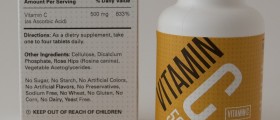
Introduction
Ascorbic acid, or widely known as Vitamin C plays a significant role in the way the body functions. Everyone knows how important vitamin C is for the health. Since the body does not produce vitamin C it has to be regularly taken in through food, various nutritional supplements and fluids. Regardless of the form it is available in, vitamin C is highly nutritional and effective to the immune system. Due to its participation in the numerous metabolic processes, a daily intake of an advised amount of vitamin C should be the prerogative in the diet and nutrition.
The richest natural sources of vitamin C are fruits and vegetables. The large amounts of vitamin C are present in kiwi, oranges, lemon. It is recommended to drink fresh juice rather than use supplements. Tomatoes, cabbage, broccoli, green paper are among the vegetables highly rich in vitamin C. Apart from these any fruits and vegetables contain some amounts of vitamin C.
Symptoms
A lack of vitamin C in the body is dangerous since it weakens the immune system. As a result, a person is prone to illnesses and both viral and bacterial infections. As an anti-oxidant, vitamin C boosts the immune system by providing enough oxygen and destroying free-radicals. It is of vital importance in the processes of iron absorption and essential for a normal blood count. Proteins could not be used properly in the body if it were not for the vitamin C. It also stimulates the healing of some wounds and burns.
A lack of vitamin C in the body for a long time more than 2 or 3 months, causes the disease scurvy. Without vitamin C, collagens, a group of proteins, cannot perform their functions. This results in the appearance of spots on the skin and swelling of some parts of the body. Other symptoms are painful joints, loss of teeth and hair. A person is sensitive to touch so bruises form easily and bleeding occurs. Bruises appear without any known reason, too.
If the vitamin C deficiency is not too severe, a number of symptoms may occur that indicate the general health is aggravated. A lack of vitamin C is manifested in the feeling of weakness, fatigue and a pale complexion. Among other more severe symptoms are anemia and anorexia mainly due to the inability of the body to absorb iron without the adequate amount of vitamin C. The person loses his or her appetite, the immune system is weakened and the person gets a cold or some disease easily. If children are deficient in vitamin C the health of their bones is affected.
The deficiency of vitamin C is diagnosed through blood tests and sometimes X-rays as far as children are concerned. Treatment involves regular daily intake of large amounts of fruits and vegetables and even some supplements if the deficiency is too severe.

















Your thoughts on this
Loading...